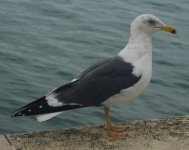michalb
Well-known member

Hello,
is this Larus fuscus (graellsii?) or L. michahellis? I'm thinking the former, as it had (the were a few of them in fact) a markedly darker mantle than the ubiquitous michahellis around. Do you agree?
Location: Lagos, Algarve, Atlantic coast of south Portugal
Date: 14.03.2018
is this Larus fuscus (graellsii?) or L. michahellis? I'm thinking the former, as it had (the were a few of them in fact) a markedly darker mantle than the ubiquitous michahellis around. Do you agree?
Location: Lagos, Algarve, Atlantic coast of south Portugal
Date: 14.03.2018





